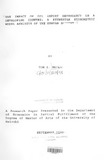| dc.contributor.author | Mailu, Tom K | |
| dc.date.accessioned | 2012-11-13T12:42:37Z | |
| dc.date.available | 2012-11-13T12:42:37Z | |
| dc.date.issued | 2003 | |
| dc.identifier.uri | http://erepository.uonbi.ac.ke:8080/handle/123456789/6282 | |
| dc.description | (data migrated from the old repository) | |
| dc.description.abstract | Oil dependence remains a potentially serious economic and strategic problem to oil importing developing countries. Large oil imports draws heavily on the scarce foreign exchange earnings of the developing countries and hence leading to reduction in imports of capi tal goods and intermediate goods, with a result that other major macro economic variables shrink. This study evaluates this preposition by developing a Keynesian econometric model of the Kenyan economy using a VAR framework.
Kenya being a net importer of petroleum products has experienced an increasing trend in the value of oil imports for the period under review, an average of 26% per annum. This is an indicator of wealth transfer from Kenya to oil producing nations, which would otherwise have been used to import capi tal and in termedia te goods. The highes t annual growth ra tes were experienced in 1974 (264%), 1980 (90%) and 1993 (101%). The oil import bill was 26.01%, 37.26 and 24.35 during the same period respectively. The temporal rise in oil prices seem to have had temporal negative effect to the major macro economic variables immediately or within the next one or three years. The inverse relationship is much seen in imports of capital goods and investment. In 1974 and 1980 the value of oil imports grew by 264% and 90% respectively. Imports of Capi tal goods shows a drop in growth rate from 12% in 1973 to -2% in 1974 and a drop from 24% in 1980 to -12% in 1983. Investments fell from 26% in 1974 to -22 in 1975 and also dropped from 49% to -2% in 1981. Imports of Consumer goods and Government Expendi ture show a direct rela tion ship wi th sharp increase in oil prices.
The empirical results show that movements of the macro variables are interdependent and therefore all of them can be targeted indirectly in any policy move. Specifically most of the macro variables react to unit shocks in imports of petroleum products. Thus any factor such as price increase and short supply of petroleum products will influence the direction of the other variables. rye found that imports of capital goods react positively to shocks in imports of petroleum products and the impact is persistent and only dies out at the very end of the forecast period. Investment and private consumption reacts cyclically to shocks from imports of petroleum products while imports of consumer goods react posi tively. Imports of petroleum products have a stable and uniform impact on government consumption.
We therefore infer that the long-term prospects for economic development and the government's abili ty to manage the economy are to some extend jeopardized through this dependence on oil imports.
Reliance on oil is a component of the oil dependence problem, but "to import or not to import?H is not the question to the Kenya economy. Even when the oil prices jump the economy will be better off to pay the higher prices than to cut oil import supplies since oil is just another input in the production process. Therefore the ultimate solution to oil dependence lies in changing the fundamental factors that give the OPEC Cartel market power and create oil dependence problem to the oil importing countries and for the policy makers to put in place measures that enhance least cost and efficient supply of petroleum products. | en_US |
| dc.language.iso | en | en_US |
| dc.publisher | University of Nairobi, CEES, Kenya | en_US |
| dc.subject | Petroleum industry and trade - - Prices - - Kenya | en_US |
| dc.subject | Petroleum products - - Prices - - Kenya | en_US |
| dc.subject | Imports - - Kenya | en_US |
| dc.title | The impact of oil import dependence on a developing country : a Keynesian econometric model analysis of the Kenyan Economy | en_US |
| dc.title.alternative | Thesis (MA) | en_US |
| dc.type | Thesis | en_US |

